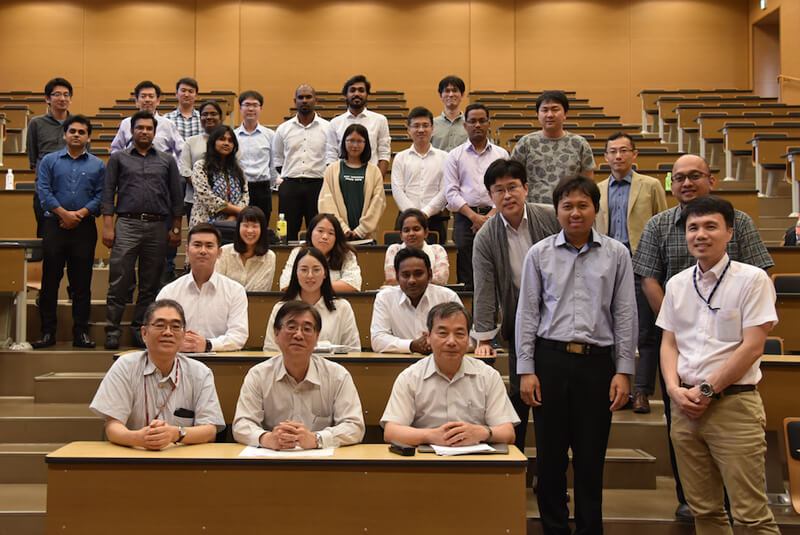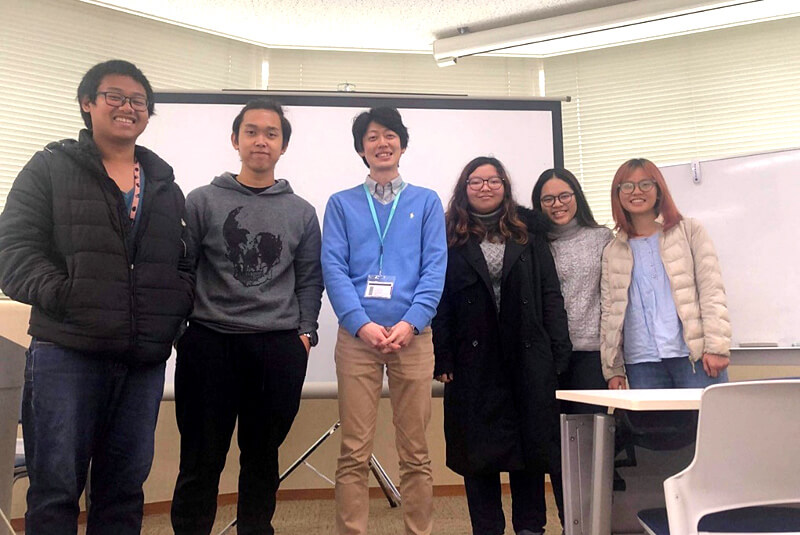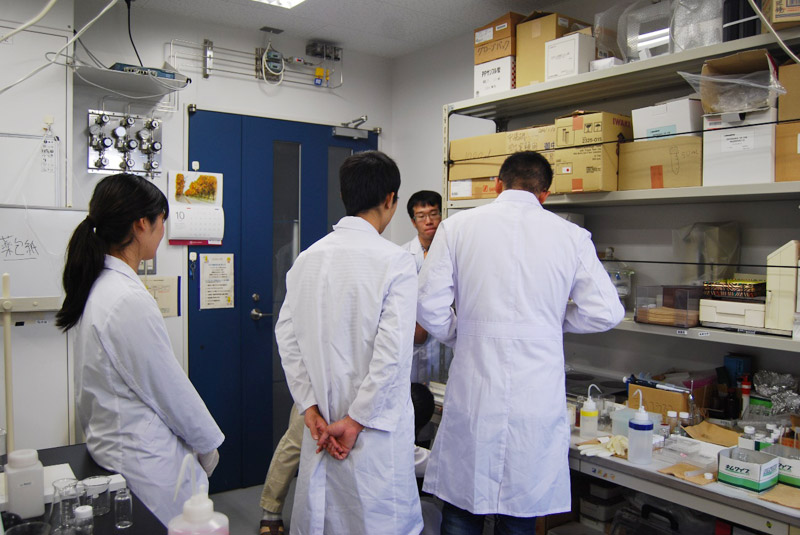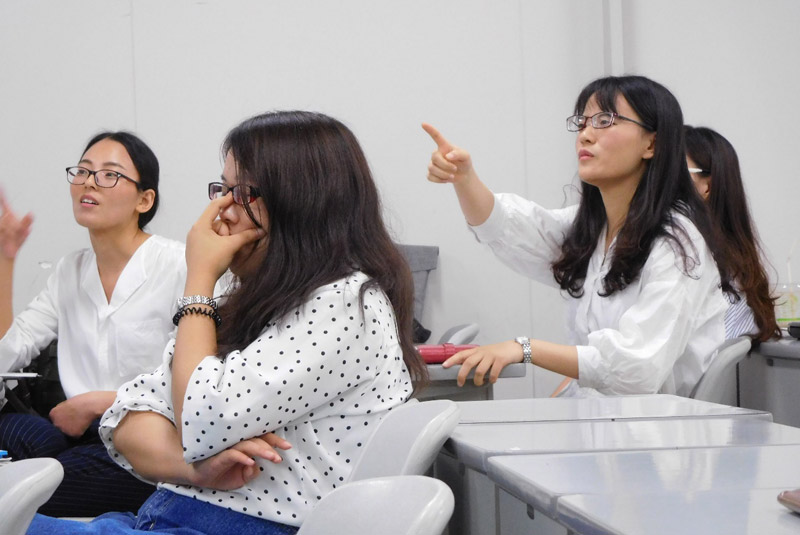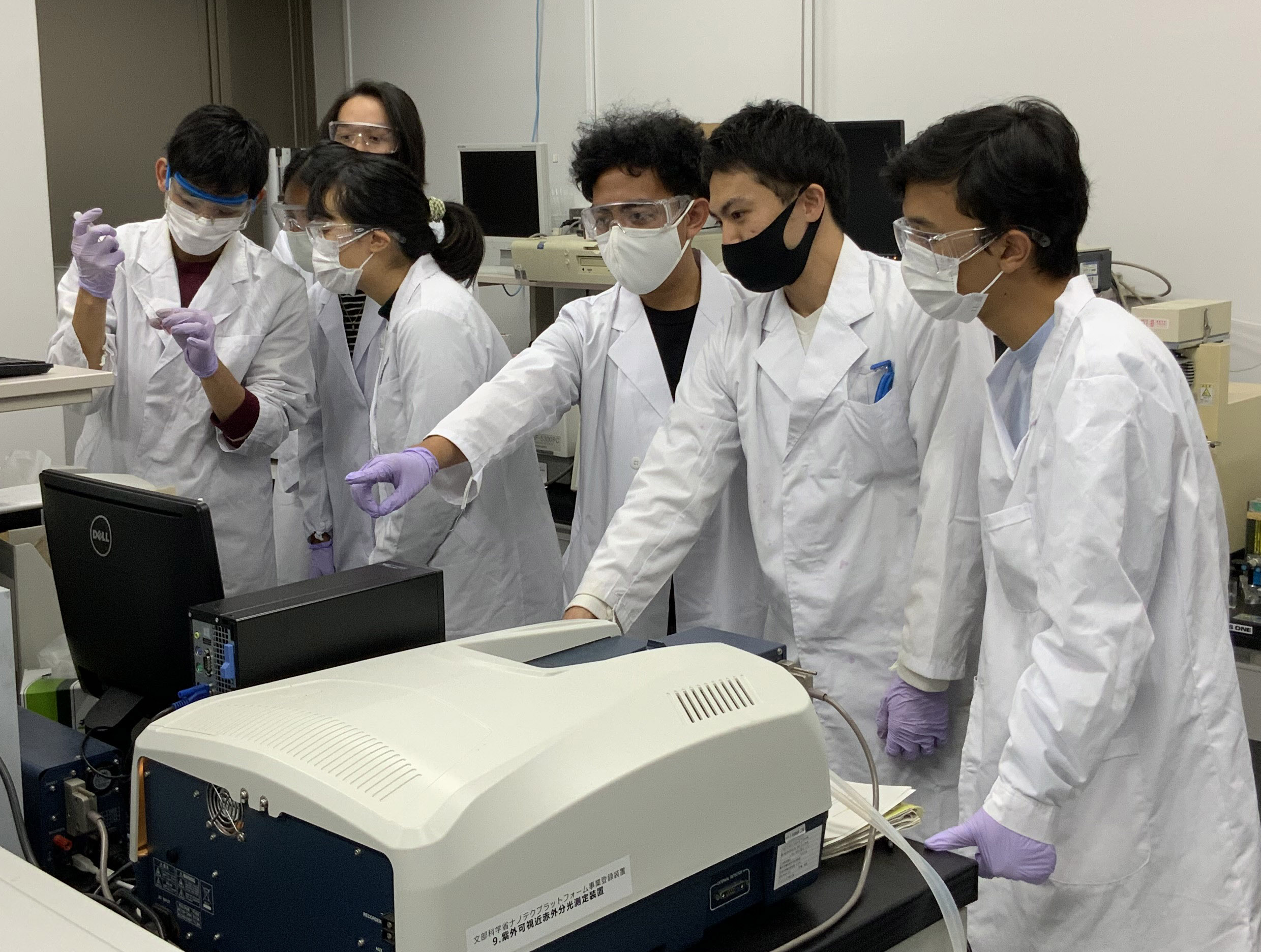Education
On the Applied Chemistry course, students are exposed to studies with an international perspective — courses which involve active collaboration with foreign countries. These courses are of a world-class level and the Department is well-known internationally in its role as one of the most advanced research hubs in the world. The Department also works with both domestic and international companies, universities and research institutions.
Graduates of the Applied Chemistry course have become active in increasingly diverse fields in recent years. For instance, they are in strong demand in the electrical, information, machinery, automobile, metals, natural resources, energy, environment, biotechnology, cosmetics, and pharmaceutical sectors, as well as more conventional chemical industries. Their activity is not limited to industry alone however; many graduates are active in public research institutions as well as universities and other educational institutions.
1. Exercises in Applied Chemistry-A for Technical Communication
In the second semester of the third year (from April), volunteer students from the master's course will provide thorough guidance on "how to read scientific literature" for six months. This program is a good opportunity for third-year students to learn not only how to read research papers involved in chemistry, but also how to use computers and make presentations. In July, the students will give a presentation about their understanding of the literature. This is a good chance to make a presentation in front of faculty members and graduate students, and to take their first steps towards academic debates.
Each student is assigned to one laboratory from the following 18 laboratories belonging to the department of applied chemistry.
Hayashi Lab, Furuta Lab, Keiji Tanaka Lab, Kaji Lab, Chemical and Environmental Science Lab, Fujigaya Lab, Goto-Kamiya Lab, Hisaeda Lab, Ogo Lab, Kimizuka Lab, Ishihara Lab, Katayama Lab, Takahara Lab, Yoshizawa Lab, Kidoaki Lab, Adachi Lab, Yasuda Lab, Masaru Tanaka Lab.
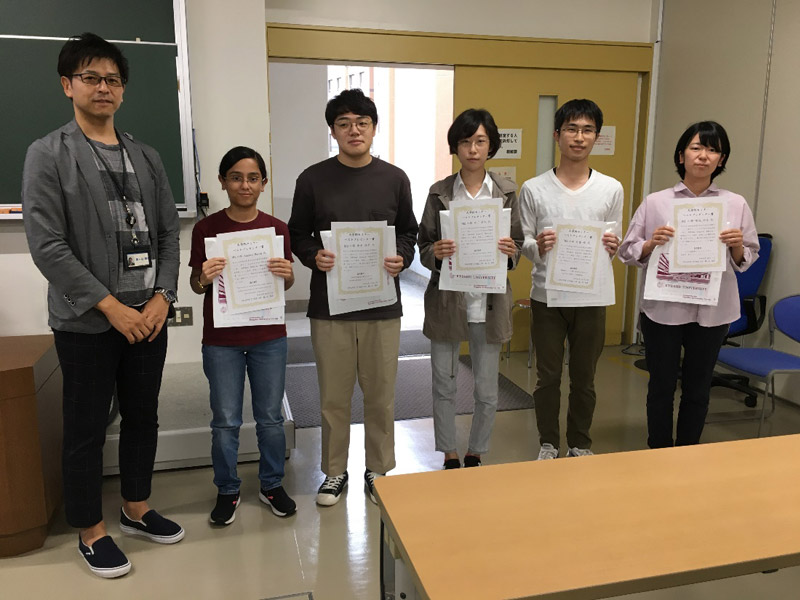
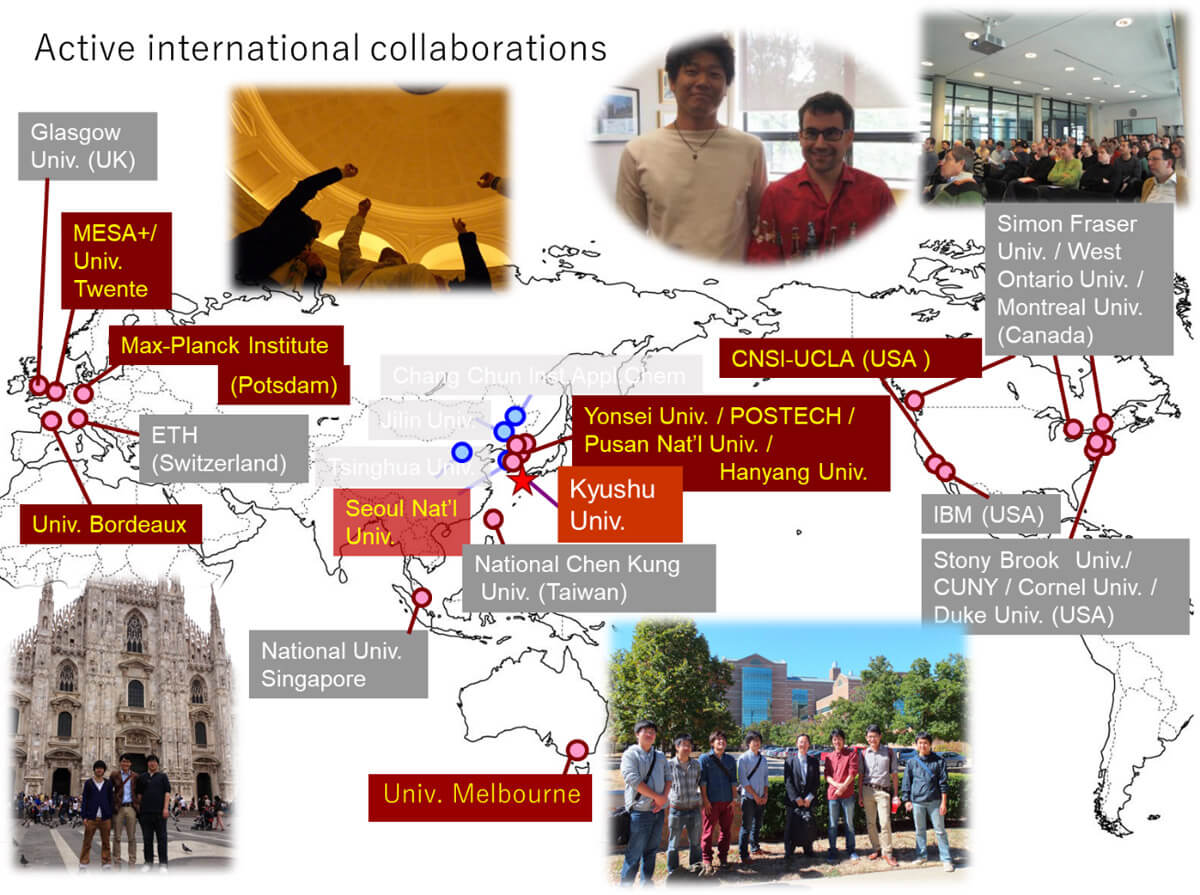
* Representative examples are shown.
The graduate school provides highly professional and wide-field science programs for applied chemistry including nanotechnology, the environment, energy, bio and medical chemistry.
For details, see syllabus
Graduates of the Applied Chemistry course have become active in increasingly diverse fields in recent years. For instance, they are in strong demand in the electrical, information, machinery, automobile, metals, natural resources, energy, environment, biotechnology, cosmetics, and pharmaceutical sectors, as well as more conventional chemical industries. Their activity is not limited to industry alone however; many graduates are active in public research institutions as well as universities and other educational institutions.
Education programs in the Chemistry and Biochemistry course
1. Exercises in Applied Chemistry-A for Technical Communication
(in the third year of the Bachelor program)
In the second semester of the third year (from April), volunteer students from the master's course will provide thorough guidance on "how to read scientific literature" for six months. This program is a good opportunity for third-year students to learn not only how to read research papers involved in chemistry, but also how to use computers and make presentations. In July, the students will give a presentation about their understanding of the literature. This is a good chance to make a presentation in front of faculty members and graduate students, and to take their first steps towards academic debates.2. Laboratory Assignment for Graduation Research (G30)
Students are assigned to laboratory research groups to carry out graduation research and task-based exercises in applied chemistry. The Laboratory Assignment programme starts in the spring semester of the third grade and continues to their graduation.Each student is assigned to one laboratory from the following 18 laboratories belonging to the department of applied chemistry.
Hayashi Lab, Furuta Lab, Keiji Tanaka Lab, Kaji Lab, Chemical and Environmental Science Lab, Fujigaya Lab, Goto-Kamiya Lab, Hisaeda Lab, Ogo Lab, Kimizuka Lab, Ishihara Lab, Katayama Lab, Takahara Lab, Yoshizawa Lab, Kidoaki Lab, Adachi Lab, Yasuda Lab, Masaru Tanaka Lab.
3. Graduate School Seminar (Masters course)
This is one of the most important programs that characterize our Department. In the second semester of the first year and the first semester of the second year of the masters course (plus the second semester of the first year and the first semester of the second year of the doctoral course), students present their research results in front of the entire faculty and students of the Department. Unlike academic conferences, giving a presentation in front of an audience with a different specialty from your own is an opportunity to develop the comprehensive appeal that is necessary in society. In addition, by participating in graduate school seminars and listening to research outside of your specialty, you will broaden your own knowledge. Presentations are closely followed and supervised by faculty members of the Department. The unique feature of our Department is that the faculty members work together to train all students. Students who give excellent presentations are awarded the Best Presenter Award.
4.Literature review (Masters course)
Many students who have participated in this literature review course have cited it as one of the most educational training programs. Students are required to select a research topic worthy of study that is not related to their own field of expertise and present their own perspective by creating a review of the most up to date research issues. In this program, students have learned firsthand that originality in research does not happen due to overnight efforts. After the oral presentation, all faculty members will take time to review the content of the presentations and provide guidance on improving the papers. Through this program, students evolve from a researcher who only knows their own research field to a researcher who is familiar with other research fields.5.Research Proposal (Doctoral course)
This is a doctoral training program to learn how to write a research proposal by setting a research topic worthy of study that is not related to ones’ own field of expertise. Students are required to raise unsolved issues from the selected topic as detailed in recent literature and to present their own, multiple aspects by creating a specific research method to logically obtain expected results. After the oral examination, students are instructed by a faculty member on how to revise the irrelevant parts of their paper. Students will cultivate the abilities for building a research plan based on knowledge and experience as a world-class researcher and for reasonable planning skills to become a leader in society.6.da Vinchi Course (Open Science Platform:OSP)
By analyzing a wide range of data, such as medical data from the Medical Information Center of Kyushu University Hospital, purchasing data from Trial Holding Corporation, and open data such as air quality and various statistics, students will develop ideas that lead to innovation through design thinking. These ideas are then used to plan and carry out the research for their own degrees. In this way, students will practice and acquire new digital transformation (DX) methods that utilize design thinking and data analysis.Worldwide research collaborations

* Representative examples are shown.
Representative classes in the undergraduate course
Students become professions in applied chemistry by studying various fields of chemistry, in which you can learn how to understand materials sutures, properties, and reactions at the atomic and molecular levels. In lab research, this knowledge is applied for the development of new materials and material/energy conversion systems for energy, environment, life and medical applications.| Basic Chemistry I/II | Intensive English | Interdisciplinary Collaborative Learning of Social issues | Introduction to Mechanical and Aerospace Engineering |
| Japanese | Primary Course of Cyber Security | Core Seminar | Introduction to Law |
| Introduction to Psychology | Global Issues | Calculus I・II | Introduction to Philosophy |
| Introduction to Japanese History | Fundamentals of Electrical Engineering and Computer Science I | Fundamental Physics I・II | Introductory Biology I・II |
| Biochemistry | Introduction to Metallic Materials | Organic Chemistry A | Complex Function Theory |
| Business Japanese I | Analytical Chemistry A | Solid Mechanics | Introduction to Information Processing |
| Inorganic Chemistry A | Physical Chemistry A | Fluid Mechanics IA・IB | Ordinary Differential Equations I・II |
| Strength Of Materials IIA・IIB | Introduction to Information Processing I・II | Logic Circuits | Drawings on Technical Design I・II |
| Fundamental Physics V・VI | Introduction to Bioresource and Bioenvironmental Science 1 | Linear Circuits I | Advanced Engineering I |
| Linear Circuits II | Advanced Engineering II | Fundamental Physics VII・VIII | Linear Algebra III・IV |
| Fundamental Organic Chemistry I・II | Computer Architecture I | Basic Laboratory Experiments in Natural Science I・II | Fundamentals of Electronics and Information Engineering I・II |
| Fundamentals of Electrical Engineering I・II | Polymer Chemistry A | Physical Chemistry B | Engineering Ethics |
| Japanese Industry | Business Japanese II | Experiments in Applied Chemistry I | Fourier Analysis |
| Organic Chemistry B | Inorganic Chemistry B | Engineering Mathematics | Analytical Chemistry B |
| Technical Communication | Polymer Chemistry B | Business Japanese III | Experiments in Applied Chemistry II |
| Introduction to Engineering Analysis and Measurement | Chemical Reaction Engineering | Task-based Exercise in Applied Chemistry A | Coordination Chemistry |
| Experiments in Applied Chemistry III | Business Japanese IV | Task-Based Exercises in Applied Chemistry C |
For details, see syllabus
